The news of Jürgen Klopp’s impending return to football was met with mixed reactions, as it was unveiled that he’s set to take on a new role as Head of Global Soccer with Red Bull.
Since first entering the football world when they bought SV Austria Salzburg in 2005, Red Bull have been a polarising entity in the sport.
On the one hand, they’ve spearheaded innovative recruitment strategies, providing players from around the globe with a pathway to the very top of the beautiful game.
On the other hand, especially in Germany, where the 50+1 rule protects fan ownership, they are viewed as a threat to the sport’s values.
In any event, as has been the case in other sports where they’ve become involved, such as Formula One, it’s hard to argue that Red Bull has not succeeded in making itself a notable presence in the global football landscape.
One key element of their success is the clear Red Bull tactical identity, which is evident in their teams’ style of play on the pitch.
Ralf Rangnick, a coach whose preferred style of play has been compared and contrasted with that of Jürgen Klopp over the years, played a pivotal role in founding the Red Bull playing principles with his hands-on role during the early years of Red Bull’s football involvement, especially with Red Bull Salzburg and RB Leipzig, where he had a hands-on role in building what has become known as the Red Bull identity.
Despite both coaches’ similarities in on-the-field performance in certain ways, Jürgen Klopp’s upcoming job with Red Bull is unlikely to be very similar to Rangnick’s from his days at Red Bull.
So, what will Jürgen Klopp’s new job entail?
This analysis aims to provide some answers and insight into what to expect of Red Bull’s soon-to-be new Head of Global Soccer as he embarks on a new journey overseeing their set of clubs.
Red Bull’s Past Meets Red Bull’s Future
Firstly, it’s worth discussing how Red Bull’s involvement in football has grown and evolved over the past two decades.
Initially purchasing a club in Austria, which has become known as Red Bull Salzburg, Red Bull have since become a multi-club ownership group, providing a bit of a blueprint for those that have followed them into that niche in the sport — a growing trend.
Klopp will oversee operations at Red Bull Salzburg, RB Leipzig, New York Red Bulls, Red Bull Bragantino and Omiya Ardija.
In addition to their extensive stable of clubs, Red Bull’s evolution in football can be visualised through their impact on their clubs — especially the two in Europe, Red Bull Salzburg and RB Leipzig.
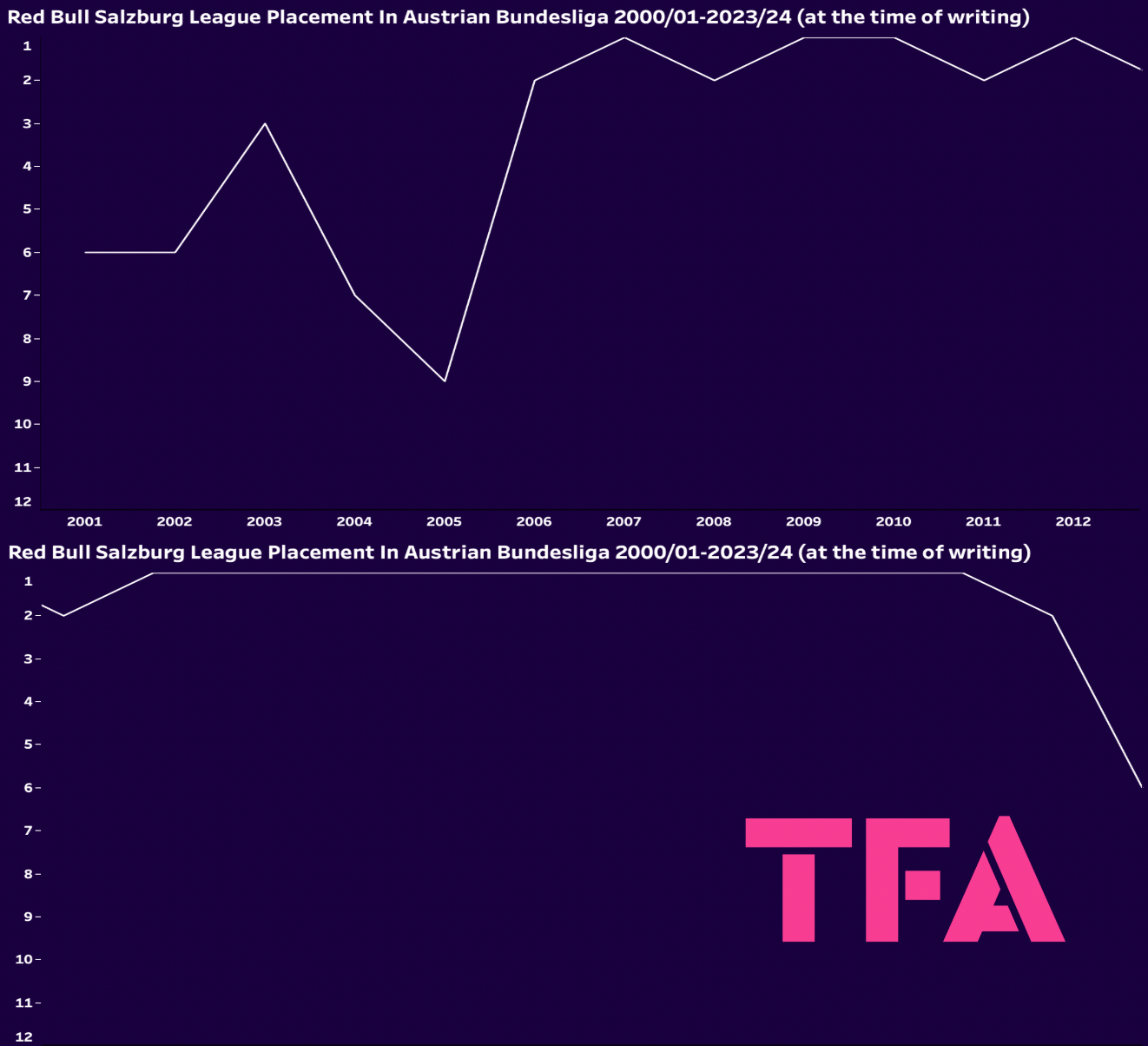
Figure 1 displays Red Bull Salzburg’s league placement from 2000/01-2023/24.
As mentioned, Red Bull took over in 2005, which marks a significant upturn in Salzburg’s league performance in the Austrian top flight.
Before Red Bull’s involvement, the team hovered around the mid-table, but since 2005/06, they’ve never finished outside the Austrian Bundesliga’s top two, though they currently sit sixth on the table this season at the time of writing.
Over the past six seasons, Salzburg have been in the UEFA Champions League group stage every year, progressing as far as the Round of 16 once — 2021/22 when they were knocked out by Leipzig’s German rivals, FC Bayern.
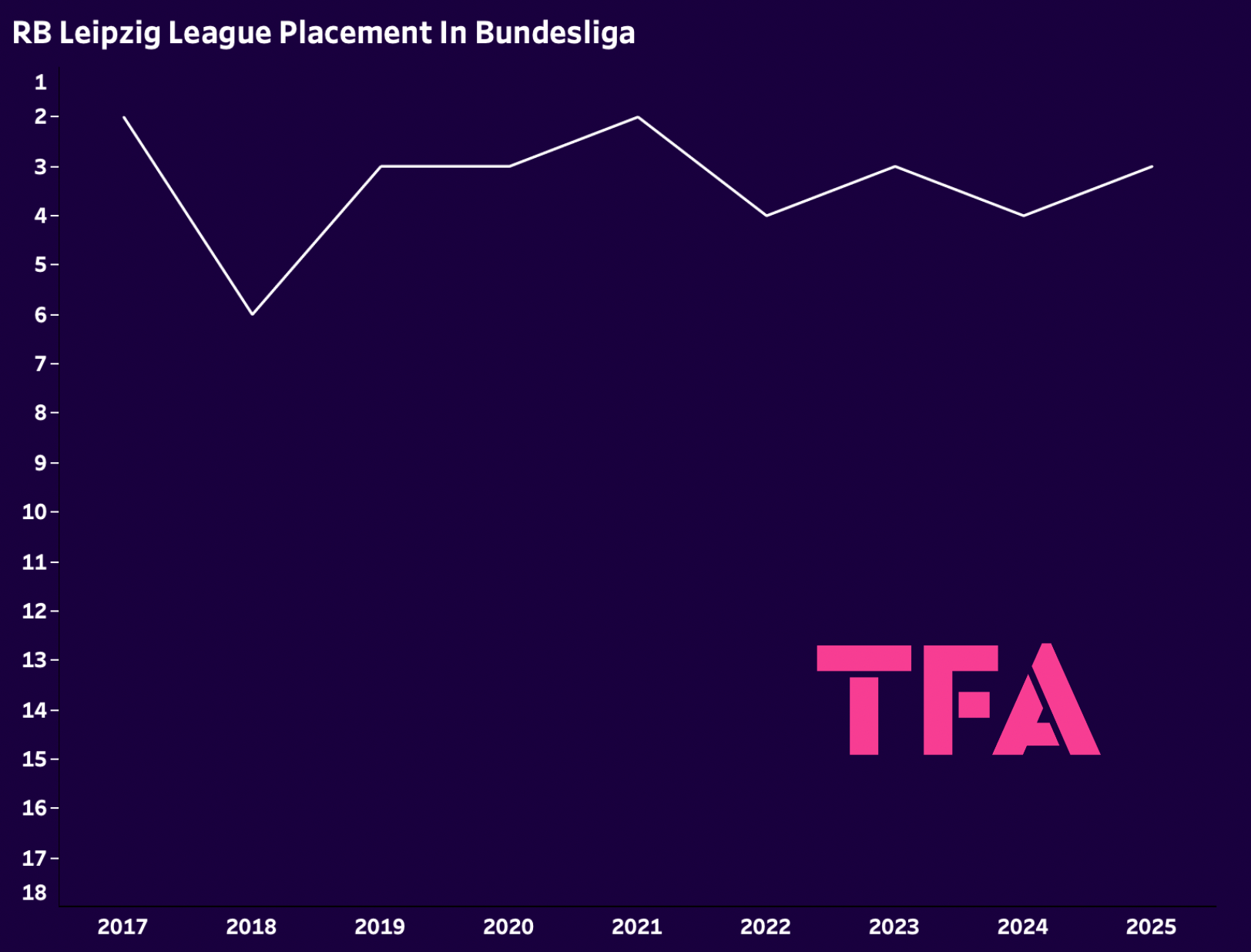
Figure 2 shows RB Leipzig’s Bundesliga placement since their first German top-flight campaign in 2016/17.
Since their founding in 2009, Leipzig have soared up the German football pyramid.
They moved from the fifth tier to the fourth tier in their first season before spending three seasons in the fourth tier and ascending to the third tier in 2013.
After one season in 3. Liga, they were promoted to 2. Bundesliga for 2014/15.
In 2015/16, they were promoted to the German top-flight under Ralf Rangnick, where they’ve remained ever since.
As Figure 2 shows, RB Leipzig made an immediate impact upon their arrival in the Bundesliga, astonishingly finishing second in their first campaign.
Since then, they’ve remained one of the league’s toughest sides, regularly earning UEFA Champions League qualification.
Like Salzburg, they’ve been part of Europe’s elite competition in each of the last six seasons, progressing to the Round of 16 three times and the semi-finals once.
So, where does Klopp come into this?
With a plethora of experience competing at the very top of the game — even winning the UEFA Champions League — Klopp has invaluable knowledge and insight for Red Bull’s management structure and coaches as to what it takes to go that bit further and establish yourself as a force to be reckoned with on the continental stage.
Klopp will be looking to help Red Bull’s clubs push on and take the next steps, whether that’s assisting Leipzig in potentially winning their first Bundesliga title, having finished second twice, helping Salzburg progress into the Champions League knockout rounds more often, helping Bragantino establish themselves as top contenders in Brazil, work with New York Red Bulls in becoming a consistent force at the top of MLS or develop Omiya Ardija and assist them in ascending the Japanese football ranks as Rangnick did with Leipzig over a decade ago.
Red Bull’s clubs are all in a different place to one another.
Klopp’s experience of having worked with clubs at each of those aforementioned phases — whether that was in his time at Mainz, with whom he ascended up to the Bundesliga from the second-tier, Dortmund, who he guided to their first Bundesliga title in almost a decade and got back to the UCL Final for the first time in well over a decade or Liverpool who he led to the summit of English football for the first time in 30 years — makes him an ideal mentor for those involved in the day-to-day operations at all of those clubs and their unique goals.
Red Bull Tactics
Undoubtedly, Red Bull will have considered Klopp’s tactical philosophy and the preferred style of play for which he’s advocated throughout his managerial career when choosing him to be the new overseer of their various footballing projects.
Rangnick built a tactical identity that’s become synonymous with Red Bull in the footballing world, which is not a million miles away from Klopp’s typical style of ‘heavy metal football’ at all.
In 2018/19, when Klopp guided Liverpool to the UEFA Champions League title and won the World’s Best Club Coach award from FIFA, Ralf Rangnick was in charge of RB Leipzig in the Bundesliga, ending that campaign having guided the side to a respectable third-place.
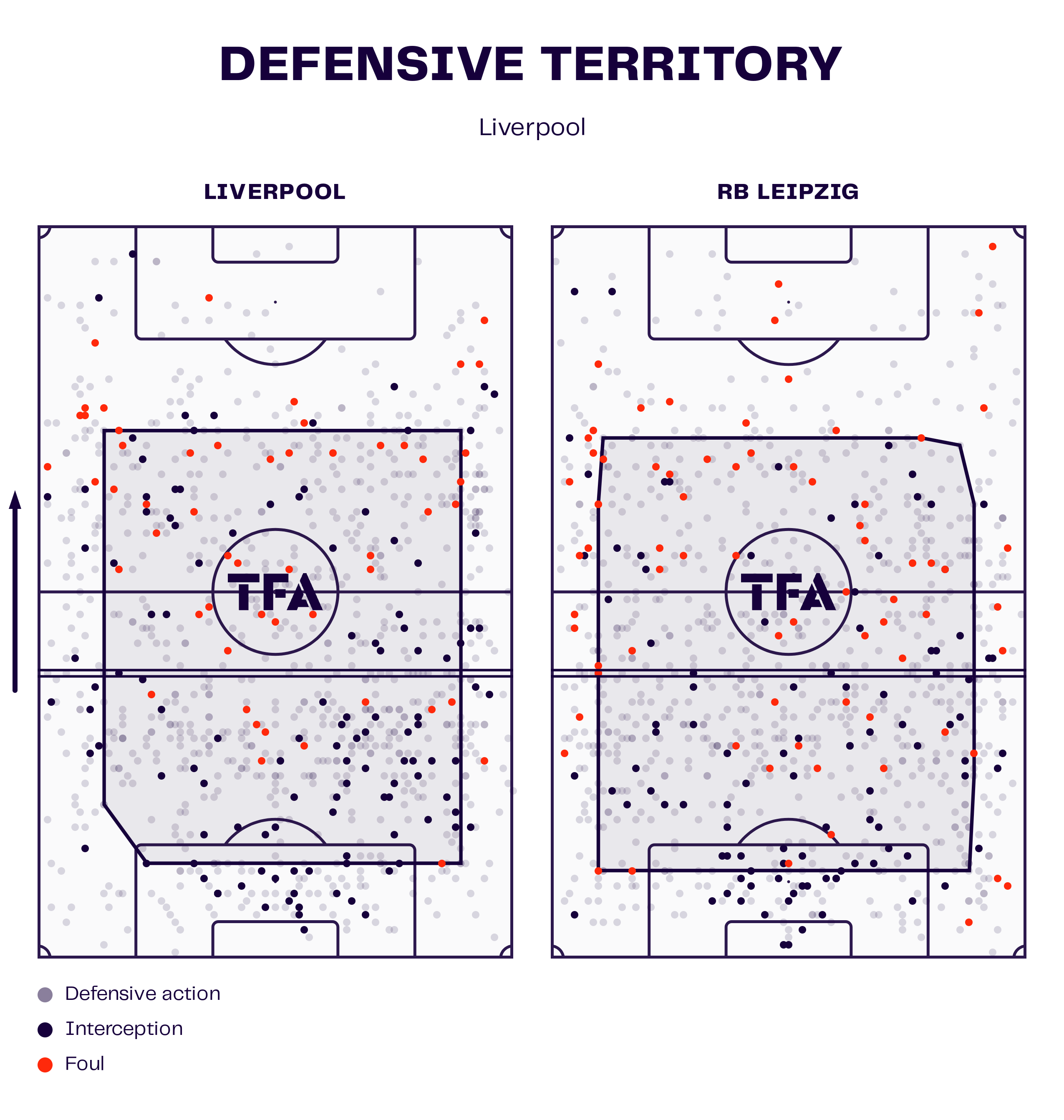
Figure 3 displays Liverpool and RB Leipzig’s respective defensive territory maps for that season.
While Liverpool undoubtedly had far more quality than Leipzig that campaign, it’s notable how the two teams’ respective defensive territory maps, including their average defensive line height, look remarkably similar — illustrative of how comparable the two coaches’ principles of pressing high and counter-pressing have plenty of parallels.
The similarities are particularly evident in the teams’ defensive performances from that campaign.
Data helps us clearly outline some key similarities: Firstly, Liverpool ended 2018/19 with a PPDA of 10.12 while Leipzig had a PPDA of 10.21 — very similar numbers.
Both teams’ respective defensive strategies bore excellent results, with Liverpool conceding the fewest goals in Europe’s top-five leagues (22) that campaign and Leipzig finishing in fourth place with just 29 goals conceded that term.
Liverpool allowed just 6.96 shots against per 90 (third-best in Europe’s top-five leagues), while Leipzig conceded just 8.61 shots per 90 (sixth-best in Europe’s top-five leagues).
These numbers don’t fully describe the two coaches’ respective defensive philosophies, but they do help us understand that Klopp and Rangnick have enjoyed success with relatively similar defensive strategies in the past.
What’s the relevance of this?
If Rangnick is the father of Red Bull’s now well-established playing style and tactics, choosing Klopp to come in and take the baton for the next phase of these clubs’ footballing development makes sense from the perspective of ensuring relative continuity and stylistic consistency as Klopp takes on the task of future-proofing their tactics for continued success as Red Bull look to take the next steps in their evolution and further make their mark in the footballing world.
Klopp will look to put his stamp on Red Bull football from a tactical perspective, mentoring coaches under the Red Bull umbrella.
Klopp will seek to establish his own coaching tree through this mentorship role, with his former assistant Pep Lijnders already in place as Red Bull Salzburg boss.
Johan Cruyff has one of the most illustrious coaching trees in the footballing world.
The likes of Pep Guardiola and Frank Rijkaard have studied under his guidance and cited the legendary Dutchman as a vital influence on developing their own tactical beliefs.
In other sports, the likes of Bill Walsh in the NFL or Gregg Popovich in the NBA have also successfully developed coaches who went on to achieve great success of their own, replicating their mentors.
In the world of business, mentorship of future leaders is ubiquitous.
Perhaps Jack Welch of General Electric and the plethora of successful leaders who spent some time sitting under his learning tree provide yet another excellent example of the value that mentorship provides.
We’ve seen Klopp develop excellent relationships with his players during his time managing teams; now it’ll be essential for him to develop great relationships with the coaches of Red Bull’s clubs and, indeed, those above him in order to adequately steer the Red Bull ship in the right direction with a coordinated vision and all parties pulling in the same direction.
At the same time, Klopp will have to be careful not to get too involved in any one aspect, given that his new role covers a large area.
As his role seemingly demands, his ability to trust, delegate, and focus on the big picture will be crucial to developing and maintaining key relationships.
Red Bull Transfer & Player Development Strategy
In addition to their playing identity and their success on the pitch, Red Bull has established a clear transfer identity of investing in young players with high potential.
This is perhaps exemplified no better than by Red Bull Salzburg’s transfer activity.
The Austrian side has developed a strong reputation for being a conveyor belt of talent and providing a solid environment for high-potential talent to hone their skills before being propelled to Europe’s strongest leagues.
World-class players like Erling Haaland, Sadio Mané, and Dayot Upamecano, to name a few, have spent time with Red Bull Salzburg honing their skills and putting themselves in the shop window for teams at a slightly higher level to snap them up.
Their success in identifying talent, nurturing it and subsequently helping players on their way to the next level has made Red Bull Salzburg a very attractive destination for young players.
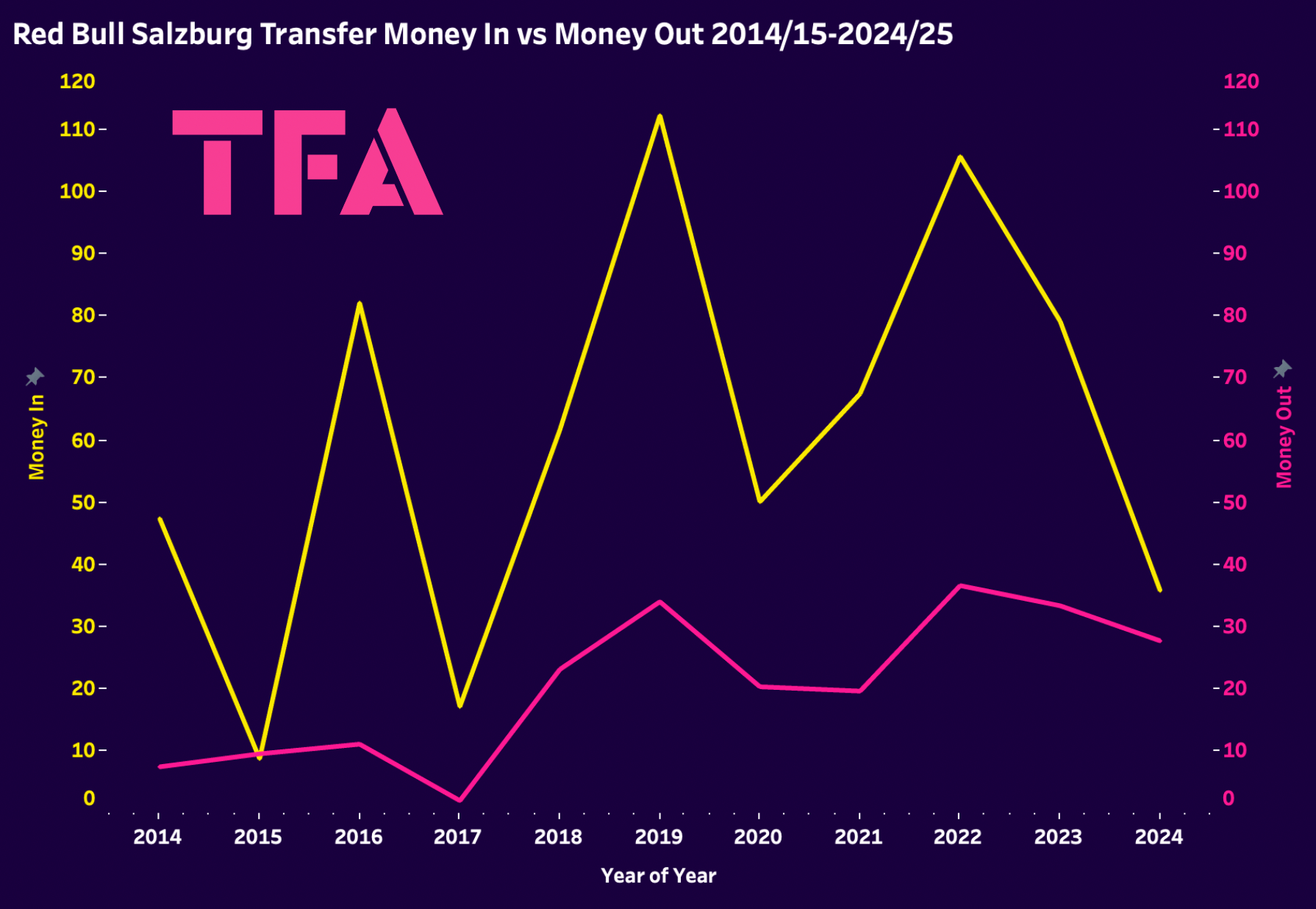
Figure 4 shows Red Bull Salzburg’s transfer fees in and out per season from 2014/15 to 2024/25.
In that time, they’ve made a net transfer profit of €443.23m — not bad business at all.
This figure emphasises just how well they’ve identified talent, developed it and then moved players on to bigger and better things, taking a nice slice of the profit for themselves to boot.
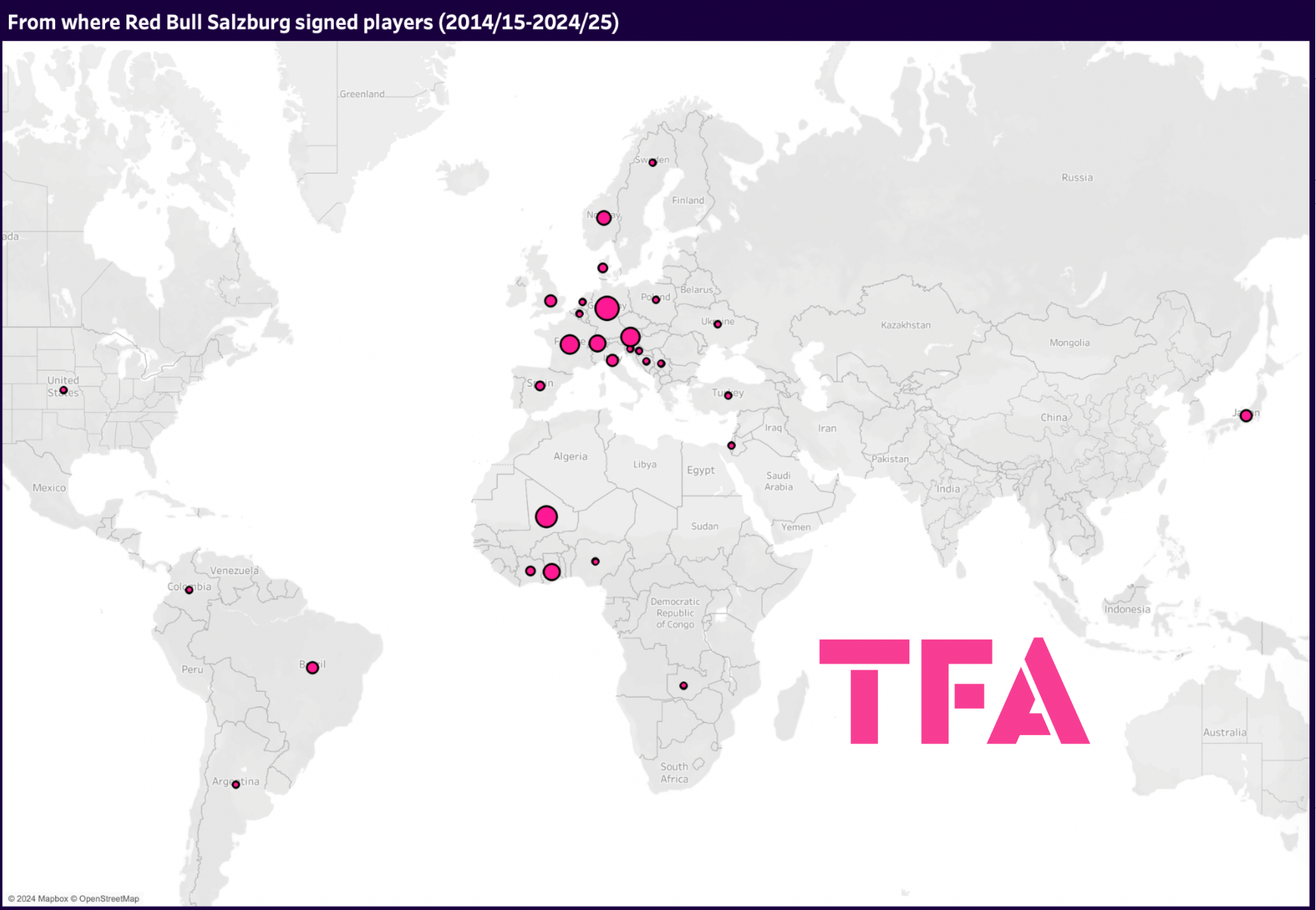
Figure 5 shows the regions in which Red Bull Salzburg has shopped for players over the past decade, excluding any transfers from Red Bull clubs.
Their success in the transfer market has been as much due to their ability to identify and extract talent from non-obvious markets as it has been due to their dominance of more local regions.
Over the past decade, Germany has been their most frequently used market for signings, with 12 signings coming from there.
However, Mali is second with 10 signings, highlighting the scope of Red Bull’s transfer business.
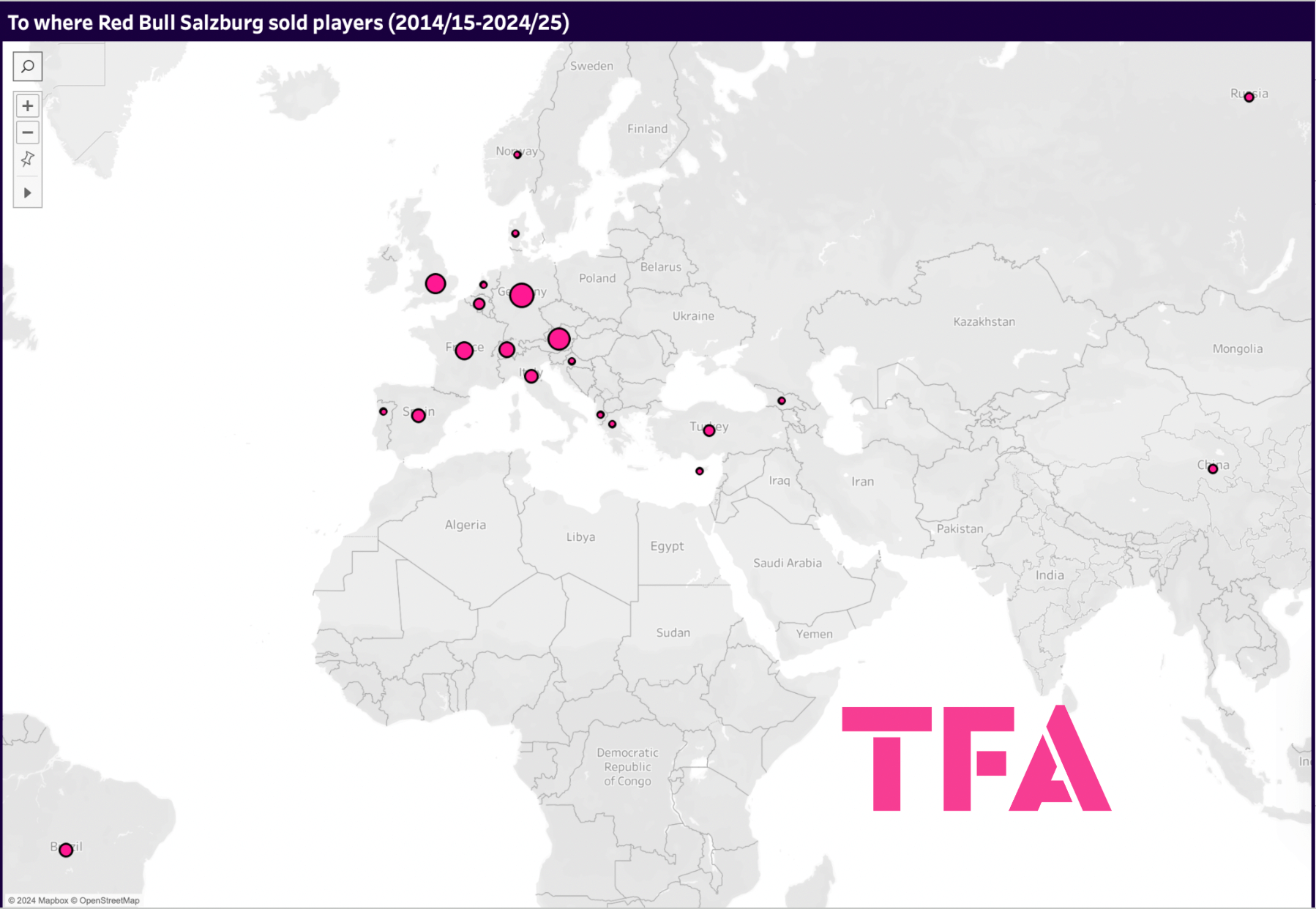
Figure 6 shows the regions where Red Bull Salzburg has sold players over the past decade, excluding any transfers to Red Bull clubs.
We can see that now, compared with Figure 5, the map has shrunk.
While Red Bull has looked far and wide for talent, they’ve primarily sold to more typical markets where you’d expect them to secure the big transfer fees, resulting in the transfer profits we mentioned earlier in this section.
Over the past ten years, Red Bull Salzburg has signed 28 players from England, Spain, France, Italy, and Germany.
However, they’ve sold almost twice as many players (48) to those five countries, where we find Europe’s top-five leagues, whose financial might helps them stay atop the global footballing landscape.
This data essentially shows how Red Bull’s transfer strategy works.
Ideally, they secure young talent for relatively low fees, invest time and money into those players’ development and end up selling them for big fees to richer clubs.
Of course, not every player’s pathway will look like this.
Still, the data show that Salzburg is able to use this strategy to some extent to quite good effect.
A critical part of this process is talent ID, where we wouldn’t expect Klopp to have a major input, though we could be wrong in that assessment.
Where we’d expect the ex-Liverpool boss to play an important role for Red Bull in this regard, though, is talent development.
That is, after players join the Red Bull family, Klopp can be instrumental in helping coaches implement processes that help those players fulfil their potential and prepare for their next move.
This ultimately generates transfer profit for Red Bull and keeps the talent production machine ticking along.
Klopp has plenty of experience in this regard, with numerous examples of players coming on leaps and bounds under his coaching throughout the German manager’s career.
Red Bull will now be able to use Klopp’s experience with nurturing and improving players to refine their talent development processes, which are already among the world’s best, along with their quality talent ID.
Conclusion
To conclude this analysis, Klopp’s arrival at Red Bull should be far more than just adding weight to the Red Bull club’s global brand power; it should also achieve this, which should not be ignored.
Red Bull can leverage the German coach’s brains and experience to enhance their footballing projects across the board.
Should Klopp and Red Bull get it right, this could start an exciting new chapter in the Red Bull football journey.
But time will tell, as this is ultimately a very different role for Klopp, who’s starting a new chapter of his own and will need time to adapt.



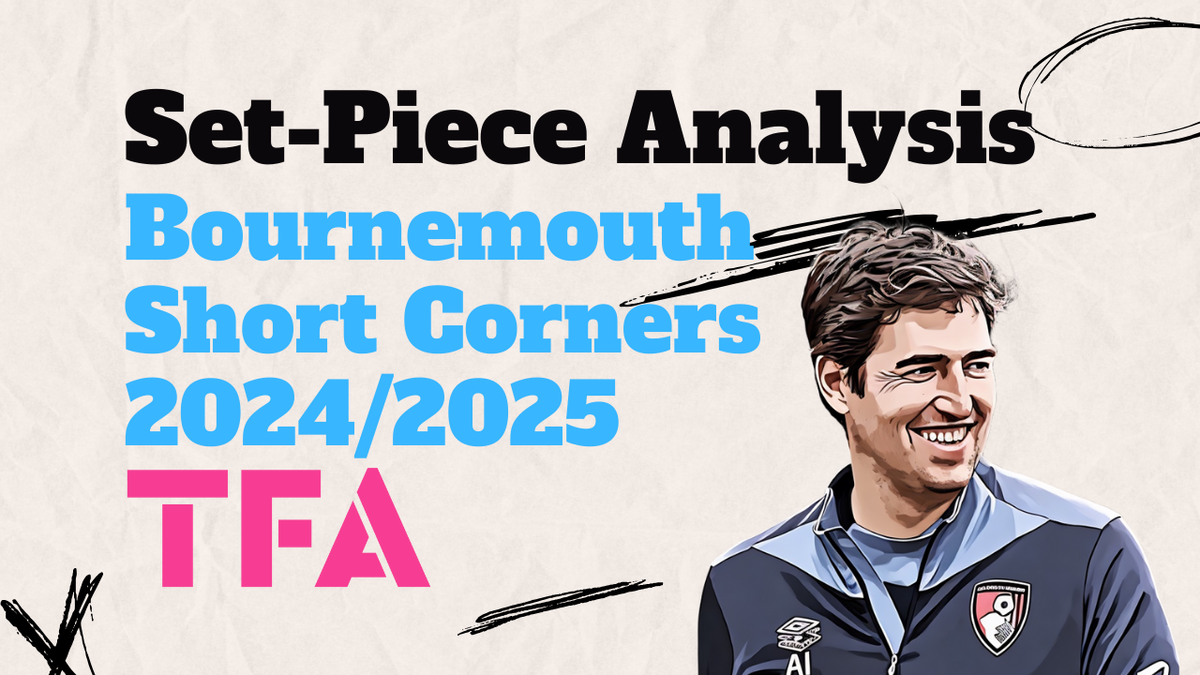

Comments